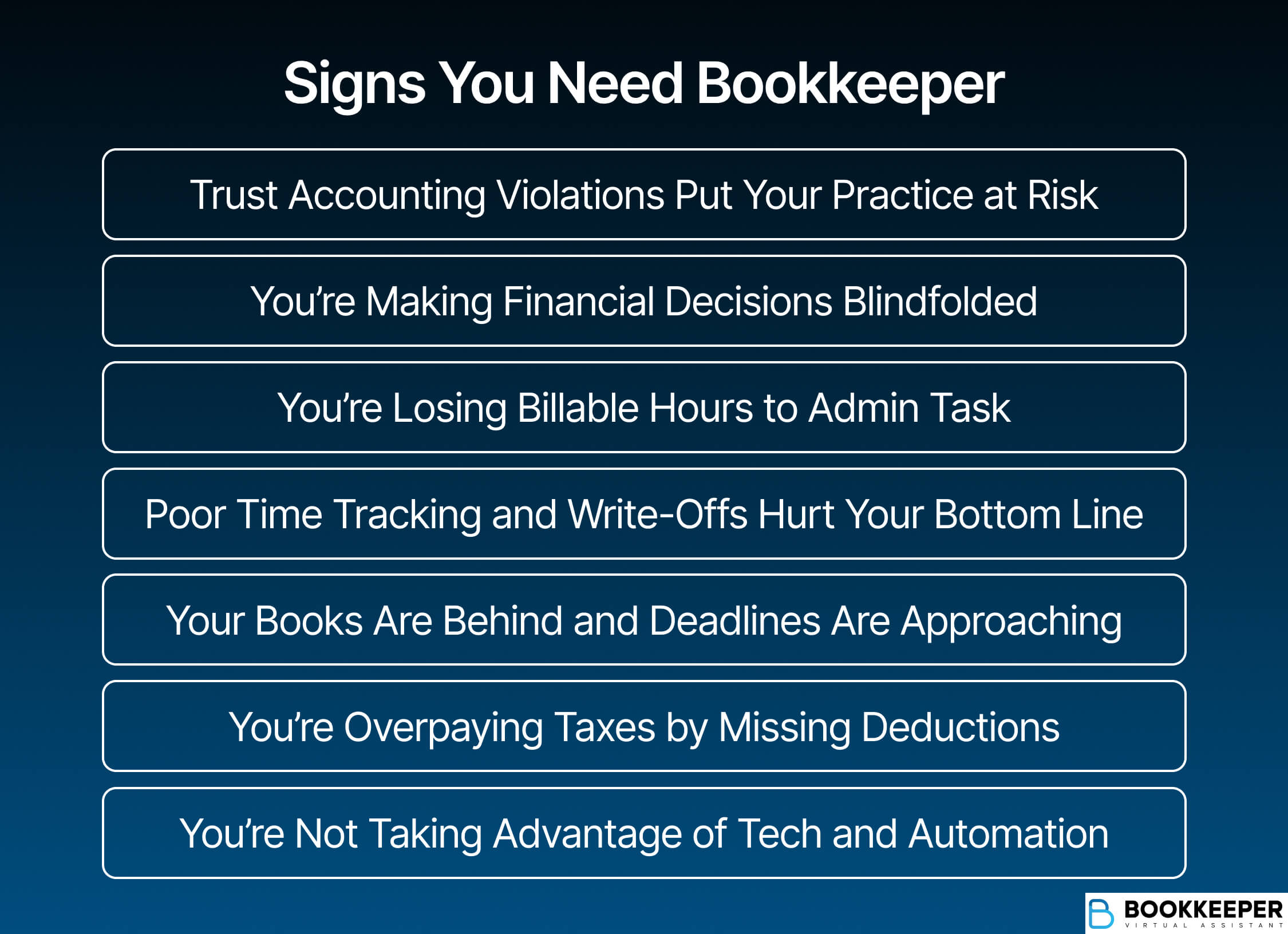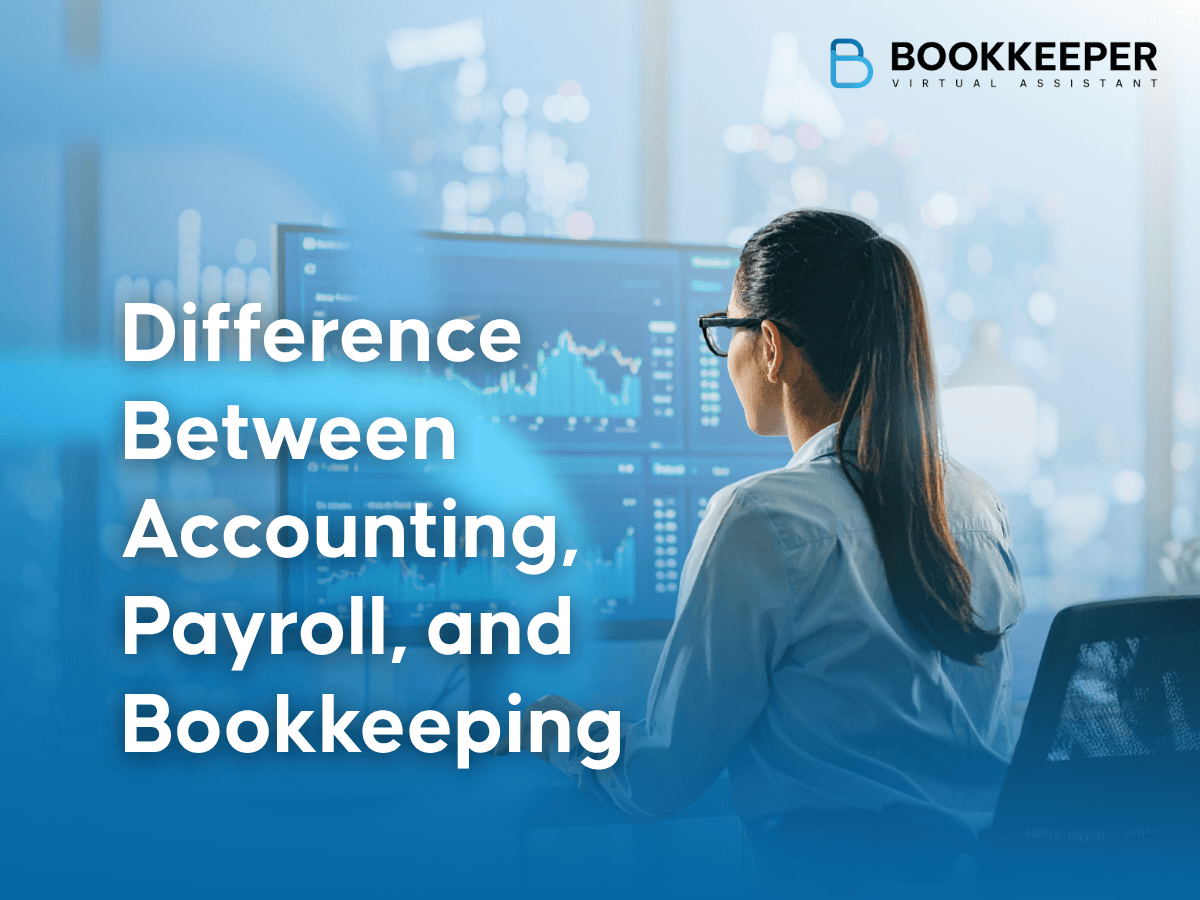1. Trust Accounting Violations Put Your Practice at Risk
Trust accounting is one of the most critical and highly regulated areas for law firms. Rule 1.15 of the American Bar Association requires lawyers to separate client funds from their own and provide clear accounting for all transactions. Mistakes in properly managing Interest on Lawyer Trust Accounts (IOLTAs) can lead to professional discipline for your practice
If you’re navigating this alone, especially without sufficient experience or understanding of trust accounts, your practice is already at risk. Without an expert bookkeeper, it’s easy to make mistakes that result in IOLTA violations, putting both your license and your firm’s reputation in jeopardy. This is the number one reason many firms seek professional bookkeeping support.
2. You’re Making Financial Decisions Blindfolded
Many small firm owners feel like they're making money but can't see where it's all going. A lack of accurate financial reports makes it challenging to understand your firm's true profitability—it's like trying to navigate a path without a map.
When you can't understand your cash flow, outstanding receivables, or expense trends, you make business decisions based on guesswork rather than facts. Even worse, inaccurate reports can lead to costly business errors.
A bookkeeper provides the clear financial picture you need to make informed business decisions. With professional support, you can avoid common errors such as misclassified expenses or unrecorded transactions that lead to unreliable data. This translates into stronger cash flow, greater growth opportunities, and the ability to identify your most profitable areas.
3. You’re Losing Billable Hours to Admin Task
Every hour you spend on bookkeeping is an hour you can't spend on client work. Your time is your most valuable asset, yet non-billable administrative tasks like reconciling accounts or categorizing expenses drain that resource.
In fact, according to a recent legal trends report, lawyers spend only about 2.9 hours each day on billable work. However, this doesn't have to be your experience; it's a great opportunity for you to capitalize on. By delegating these tasks to a bookkeeper, you can free up more of your time to focus on billable work and growth-driving tasks.
4. Poor Time Tracking and Write-Offs Hurt Your Bottom Line
Inaccurate time tracking and poor invoice management directly reduce your revenue. When you don't have systems to capture all billable time and expenses, you’re essentially giving away your services for free. On top of that, poor accounts receivable management often leads to more write-offs and long delays in collections. Professional bookkeeping ensures accurate billing, timely collections, and stronger realization rates—helping you keep what you’ve earned.
5. Your Books Are Behind and Deadlines Are Approaching
Tax season is a nightmare for firms with disorganized books, and falling behind creates a ripple effect of problems. Common issues include rushed tax filings and losing track of deductible expenses, which can lead to missed deductions and even errors that could trigger an audit.
When your records are current, you can take advantage of tax strategies and avoid the stress of scrambling to meet deadlines. Consistent bookkeeping prevents these issues from building up.

6. You’re Overpaying Taxes by Missing Deductions
Legal practices have numerous potential deductions that many attorneys overlook. From continuing education and professional memberships to office supplies and technology expenses, missed deductions cost you money every year.
A bookkeeper familiar with legal practices knows which expenses qualify and maintains the necessary documentation to support your deductions. In many cases, the tax savings alone pay for the cost of bookkeeping services.
7. You’re Not Taking Advantage of Tech and Automation
Modern legal accounting software can streamline and automate many processes, from trust accounting to expense tracking. However, these systems require proper setup and ongoing management to be effective. Without bookkeeping expertise, you might underutilize powerful tools or make costly implementation mistakes.
Small firm owners often struggle with the initial setup, proper integration with other tools, and understanding how to use the software to its full potential. While software alone can’t solve every accounting challenge, having a legal bookkeeper manage it ensures you get the most out of your tools without the steep learning curve and identify opportunities for further automation.

Considering Hiring a Bookkeeper?
Running a small law firm is tough enough with limited resources, intense competition, and ongoing business development efforts. Adding complex financial management on top of client demands and case preparation makes it even more challenging.
The signs above show when your practice has outgrown DIY financial management. If trust account compliance becomes a daily concern or administrative tasks consume hours you should be spending on client work, it may be time to seek professional bookkeeping support.
At Bookkeeper.law, we help small law firms regain control of their finances without the cost of hiring full-time staff. Our bookkeepers understand the unique challenges law firms face and provide the specialized support you need to stay compliant, organized, and focused.






